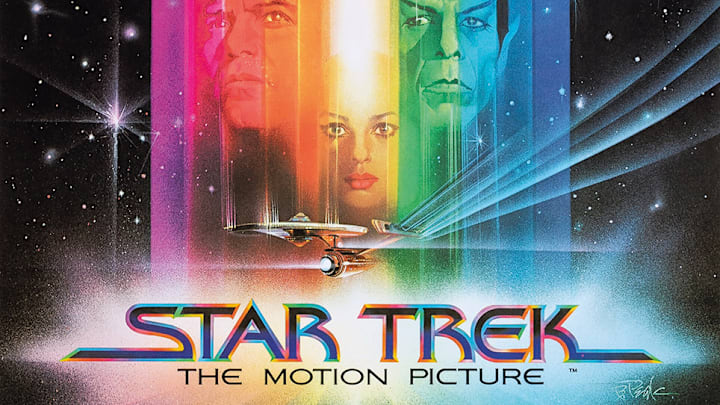Trying to define what Star Trek is may be one of the most contentious topics in the fandom. After all, Star Trek is many things and has had many fans and contributors, all of whom have their own perspectives on what is essential to Star Trek. In honor of its 45th anniversary, though, I will argue that Star Trek: The Motion Picture is the most quintessentially "Star Trek" of all 13 films.
Themes
There is a lot of Star Trek, and it touches on many different themes and topics. At its core, however, Star Trek is about curiosity and exploration, and the hope that Humanity will one day find ways to face adversity through peaceful compassion, with violence as an absolute last resort.
Star Trek: The Motion Picture not only expresses these themes but makes them central to its plot. The Klingons at the beginning of the film almost immediately resort to firing their ships' weapons against V'Ger. Kirk and the crew of the Enterprise do not. They're prepared for violence, but consistently hold off, to understand V'Ger better.
Even as V'Ger poses a direct threat to Earth and Humanity, the Enterprise crew strives to understand what V'Ger needs. Then, they try to meet those needs without violence, even when V'Ger is actively threatening violence. In the end, they succeed.
Of course, Star Trek is also about adventure, and has been since the original series. This is, admittedly, where The Motion Picture is a little light. While it is a gorgeous movie, it is not nearly as riveting as a film like Star Trek II: The Wrath of Khan. Still, TMP's setting within V'Ger is arguably more imaginative and adventurous than most of the films' settings of generic space and planets.
Gene Roddenberry's involvement
Star Trek has been a collaborative effort since its inception. That is the way TV shows and movies generally work. Even so, Star Trek could not have existed at all without Gene Roddenberry, and it is valuable to gain insight into his views of his own creation.
Of the six Star Trek films produced during his lifetime, Star Trek: The Motion Picture was the only one in which Gene Roddenberry was actively involved. This, coupled with the fact that Roddenberry penned the novelization of the film, makes TMP unique among the Star Trek films for its expression of the vision of the franchise's creator.
One way to notice this, interestingly enough, is in the costume design. The Starfleet uniforms of TMP are decidedly less militaristic in appearance than the famous "Monster Maroons" introduced in The Wrath of Khan.
Despite having a navy-like style of ranks and terminology, Roddenberry was frequently quoted saying that Starfleet was not a military organization. Instead, Starfleet was about peaceful, scientific exploration. Having uniforms that looked less militaristic helps to support that idea, even if they do look like pajamas.
A beautiful, optimistic future
Although TMP almost certainly owes part of its existence to the success of 1977's Star Wars, Star Trek's vision of a space-fairing humanity is quite different. Rather than the (then-novel) "used universe" aesthetic of Star Wars technology, Star Trek suggests a future that is sleek and beautiful. The Motion Picture emphasizes this in its cinematic style as much as its production design.
Some of this beauty comes from the visual effects work led by Douglas Trumbull (who also worked on 1968's 2001: A Space Odyssey), as well as Jerry Goldsmith's gorgeous score. It also comes from the prominence of a massive recreation area on the Enterprise, showing that the Star Trek future values all aspects of Humanity, and not just working.
The truest Star Trek?
Perhaps it is foolish to say that something is the "truest" Star Trek. Star Trek has always been multifaceted. That's why "The Trouble with Tribbles" and "The City on the Edge of Forever" are both classic episodes. Still, of all the Star Trek movies, The Motion Picture is perhaps the most uniquely Star Trek.
Very few modern franchises are built on the pillars of scientific exploration and human compassion like Star Trek is. By using every aspect of the plot and design of the film to centralize those themes, and not battles or interpersonal conflict, Star Trek: The Motion Picture is the kind of movie that couldn't be called much of anything other than "Star Trek."
